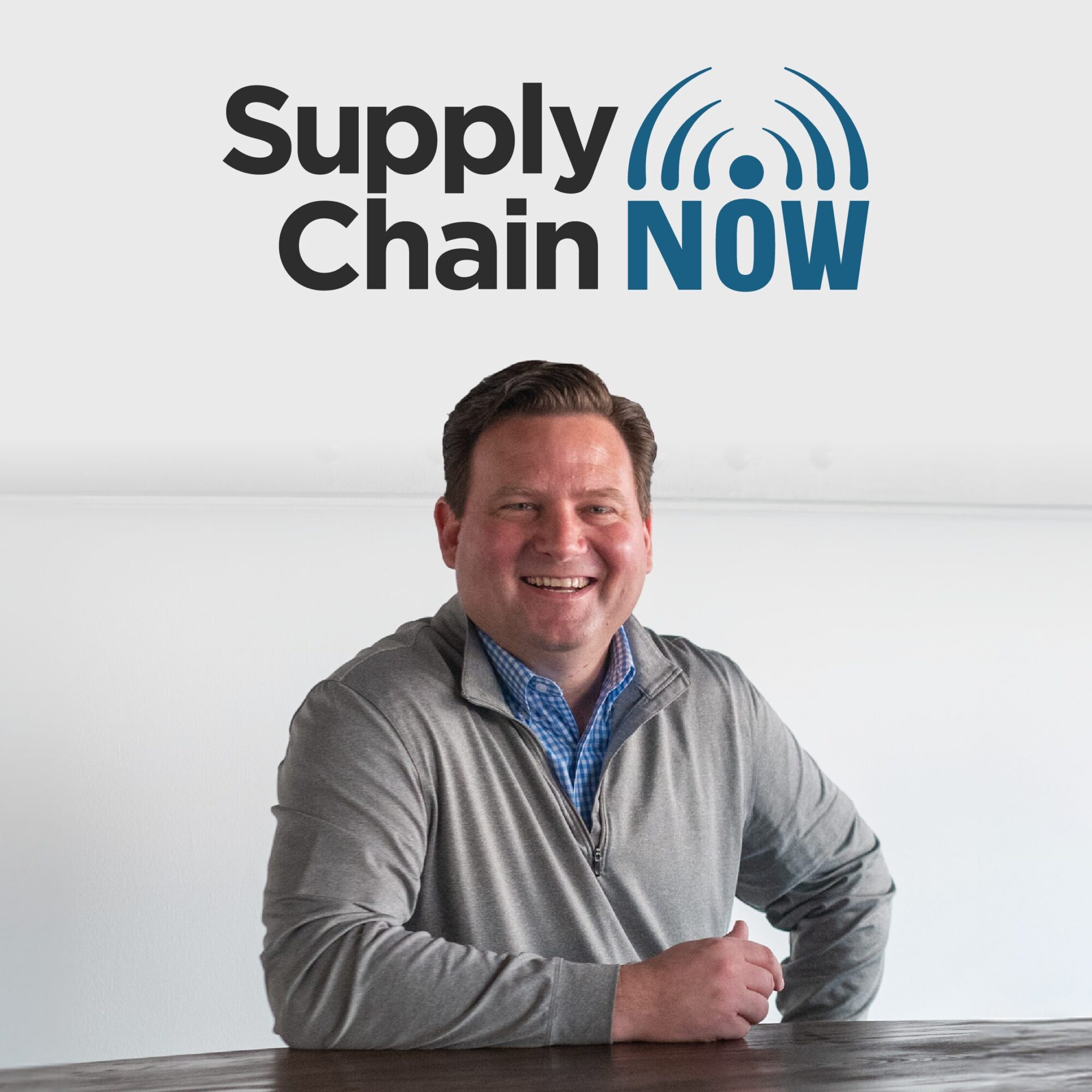
Supply Chain Now
Have you heard? The voice of global supply chain has arrived! Supply Chain Now brings you the best and the brightest in the business. Tune in alongside a worldwide audience as our thought-leaders highlight the people, the technologies, the best practices, and critical issues impacting global supply chain performance today and tomorrow. Confront new challenges and seize the latest opportunities when you join the industry leaders who are inspiring the next generation – and making global business happen.
-
Subscribe
-
LISTEN ON
-
FOLLOW US
Search Results
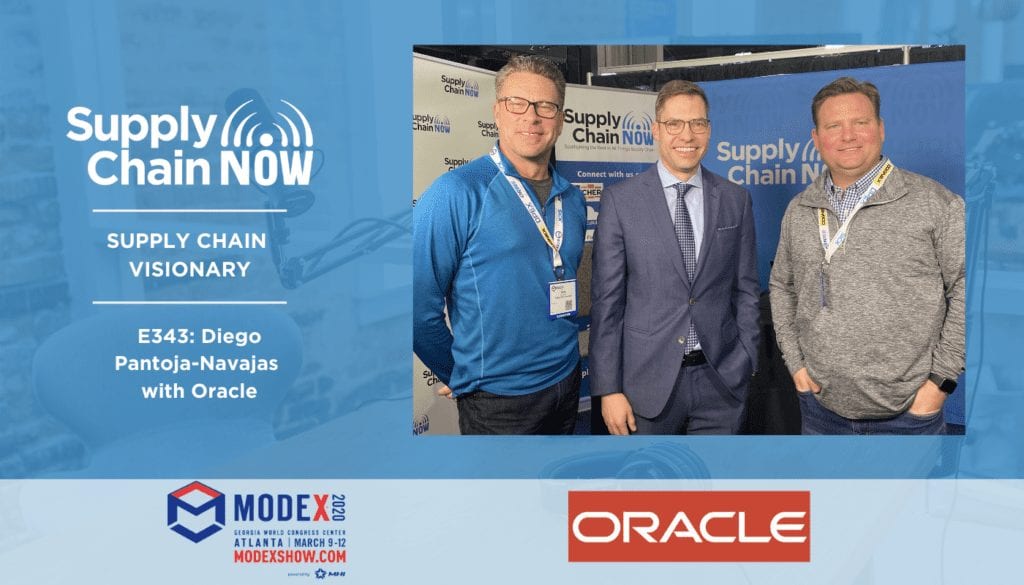
podcast
March 21, 2021
Supply Chain Now Episode 343
“I think supply chain is one of those industries that will never settle with one model. Supply chain has moved away from the linear model to consumer-centric models where consumers are at the center of the supply chain and everything evolves about us.” – Diego Pantoja-Navajas with Oracle Supply chains are more data-driven than ever, breaking down silos and allowing faster, better, more precise decisions between all of the players in a chain. When companies make the decision to put real-time consumer preferences at the center of their supply chain decisions, they have to be ready to move quickly, and respond to cues from seemingly unrelated external sources such as the sports world and social media rather than internal cues such as inventory levels and operational plans. Diego Pantoja-Navajas is the Vice President, WMS Cloud Development for Oracle and Founder of LogFire, which was acquired by Oracle in 2016. In this interview, Diego Pantoja-Navajas and Supply Chain Now Co-hosts Greg White and Scott Luton talk about: Why inventory management presents such a huge opportunity for operational efficiency and financial health How all companies – even services firms and retail operations – are effectively becoming technology companies today Why the…
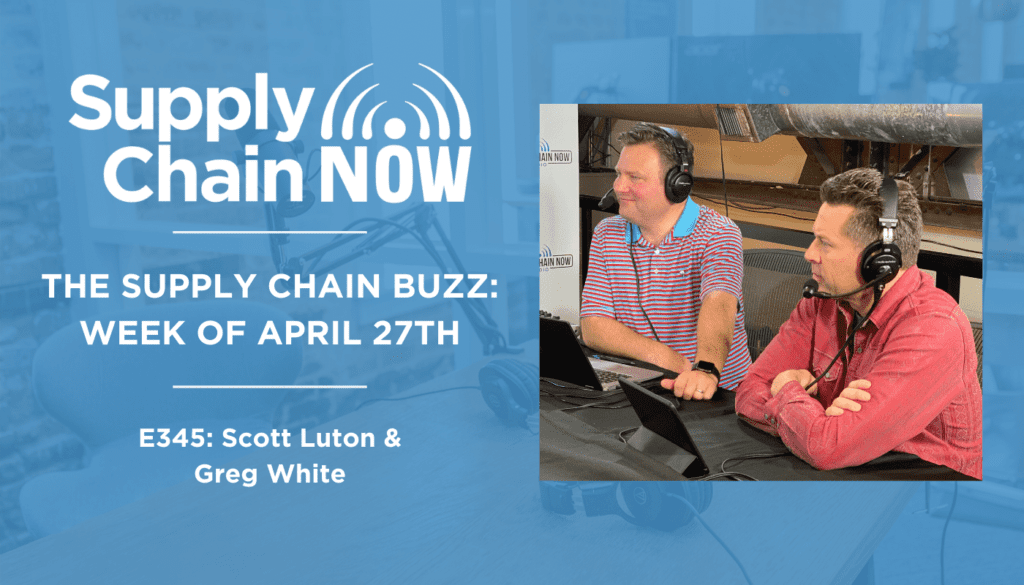
podcast
March 21, 2021
Supply Chain Now Episode 345
On this episode of Supply Chain Now, Scott and Greg cover the top news in supply chain for the week of April 27th.
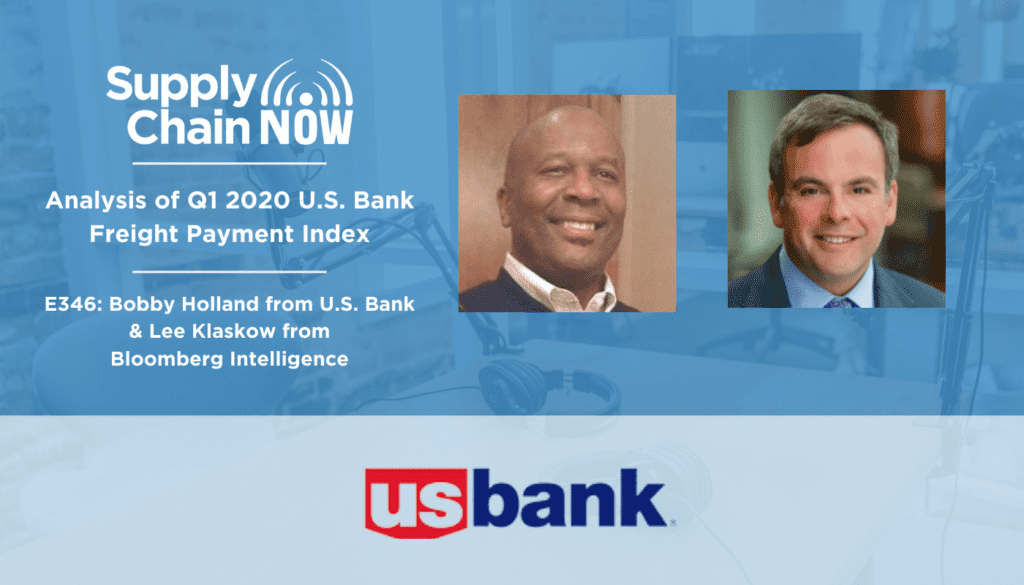
podcast
March 21, 2021
Supply Chain Now Episode 346
“I think we’ll look at back at this report 12 months from now and look on the data pretty fondly. It looks like [Q1] is probably going to be a peak in terms of demand. From our standpoint, things are collapsing.” – Lee Klaskow, Senior Analyst for Bloomberg Intelligence U.S. Bank processed $28.8 billion in freight payment transactions in 2019. Those payments and the data that accompanies them are analyzed quarterly by Bobby Holland VP/Director of Freight Data Solutions at U.S. Bank and his team. The FPI report includes quarter over quarter, year over year, and full year data and analysis. According to the official report released by U.S. Bank, “The U.S. Bank Freight Payment Index indicates that both shipments and spend contracted from Q4 2019. Despite strong movement of consumer goods in March, it was not enough to balance out the market sectors impacted by shutdowns, such as restaurants and auto factories. Shipments were down 1.8% and spending dropped 3.7%, both from the previous quarter. As shippers and carriers approach the second quarter, we anticipate that both indicators could continue to contract.” In this interview, Bobby is joined by Lee Klaskow, a senior analyst for Bloomberg Intelligence, to…

podcast
March 21, 2021
Supply Chain Now Episode 347
“We do energy treasure hunts in our own facilities for our operations. It’s a great method. I’ve personally done 100 of them globally and some at our suppliers. We also did one for a customer, which was a lot of fun. We find them to be great opportunities for energy savings, water reduction, and carbon savings.” – Al Hildreth, Global Energy Manager for General Motors For many companies, the supply chain represents a significant portion of their carbon footprint. This means that in addition to investing in renewable energy sources and carefully managing the materials and process used in their operations, they have to collaborate with suppliers and customers to have the maximum impact on the environment. Al Hildreth is the Global Energy Manager for General Motors and Lecedra Welch is the Program Manager of Environmental Sustainability at AIAG. They joined Supply Chain Now Co-hosts Greg White and Scott Luton to talk about: Going beyond opportunity identification to reach action planning, the step in the process where potential benefits become tangible results The sheer number of resources, frameworks, and support systems that are available for companies and industries that are looking to reduce their carbon footprint and impact on…
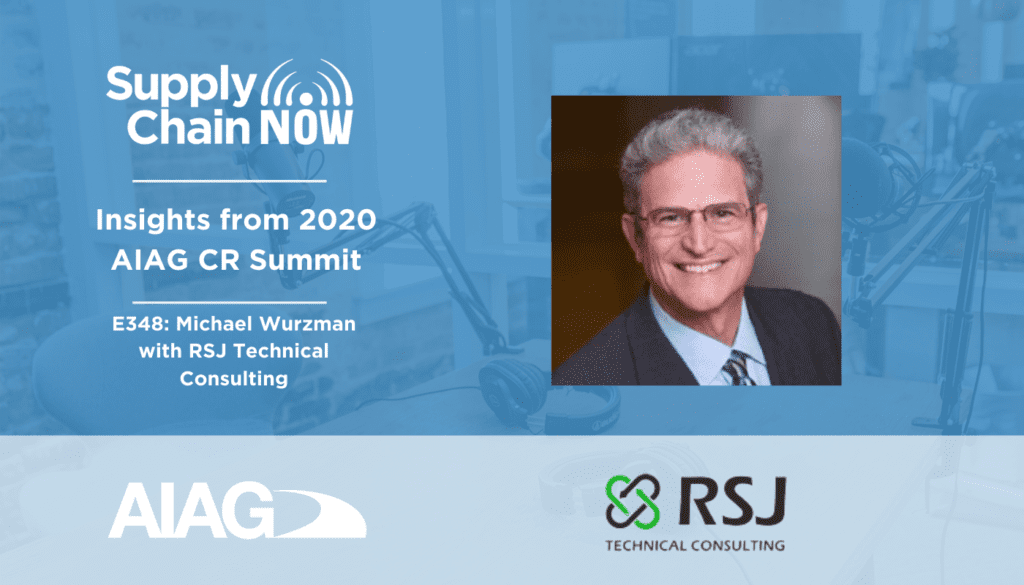
podcast
March 21, 2021
Supply Chain Now Episode 348
“We’re no longer just selling products in the marketplace as a company, but all this data is required to be part of the product to make the sale.” – Michael Wurzman, President and Founder of RSJ Technical Consulting Early in his career, Michael Wurzman experienced the first Earth Day and the 1970’s energy crisis. In 2000, faulty construction caused a gas pipe in his home to fail, leading to a catastrophic explosion. Fortunately, no one was hurt, and while Michael and his family lost almost everything they owned, he found his calling: working to remove toxic products and materials from our supply chains. It can be no wonder, then, that he is now the President and Founder of RSJ Technical Consulting, a firm that specializes in product substance compliance and multi-tier supply chain sustainability. In this interview, Michael shares the struggles involved in the fight to improve the sustainability of the global supply chain with Co-hosts Greg White and Scott Luton: Data quality is a challenge that needs to be addressed collectively by entire industries, not contained within the walls of specific companies. This requires high levels of collaboration and visibility. Companies should be more driven by how much…
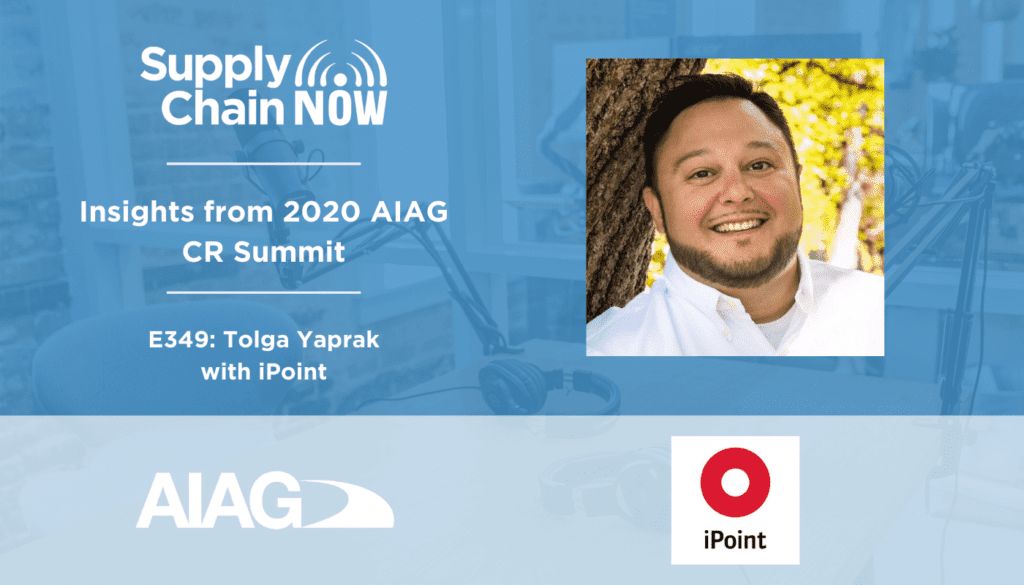
podcast
March 21, 2021
Supply Chain Now Episode 349
“Over the last 15 years or so, we’ve seen a big push where products are not only valued on the components they’re made out of but also who made them, where they were made, what materials are inside, so now those are being tracked and monitored.” – Tolga Yaprak, Senior Consultant at iPoint Inc. Because today’s supply chains extend through many companies, countries, and continents, they begin very far away from where they end up. This means that the chain extends through parts of the world and industries that are plagued by working conditions that do not meet the labor standards set by countries in the industrialized world. This creates significant challenges for companies who want to benefit from global partnerships while remaining compliant with standards and regulations governing forced labor, modern slavery, human trafficking, and conflict minerals. Conditions are always changing, requiring ongoing monitoring, and it is essential that companies not just be compliant – they have to be able to prove they are compliant. These are not easy, comfortable topics to discuss, but corporate leadership teams have to address them head on if their CSR policies are to be fully operationalized. In this conversation, Tolga tells Supply…
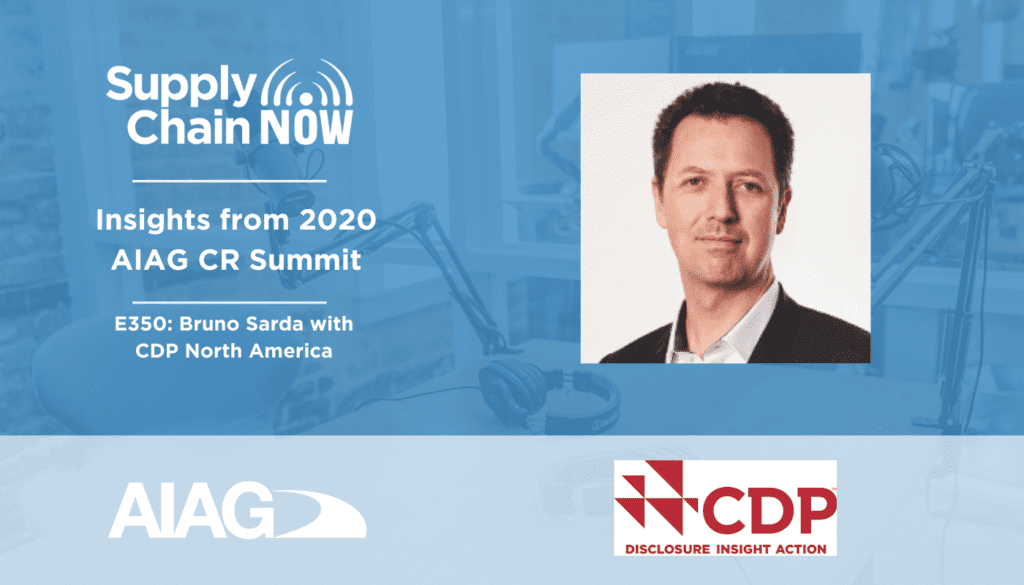
podcast
March 21, 2021
Supply Chain Now Episode 350
“Ultimately, none of this matters if it doesn’t lead to change and to specific actions.” – Bruno Sarda, President of CDP North America CDP was founded 20 years ago to achieve a relatively simple goal: to create a systemic link between environmental information and financial information. At the time, companies were just starting to try to understand how emerging environmental issues, most specifically climate change, impacted investment portfolios and market returns over time. Investors wanted data but none was available. Bruno Sarda, President of CDP North America, has worked to create a unique information capture system that addresses climate change, water security, commodity-driven deforestation, and some specific commodities: soy, palm oil, timber, and cattle. He brings together academics, policy makers, and activist groups – and then brings business and finance to the table. In this conversation, Bruno explains to Supply Chain Now Co-hosts Greg White and Scott Luton: Why it makes good business sense to invest in the environment (For the last seven years, companies with an ‘A’ rating from CDP have outperformed their peers in the stock market by an average of 5.5% annually.) The ways in which supply chains represent a significant opportunity to scale and systematize…
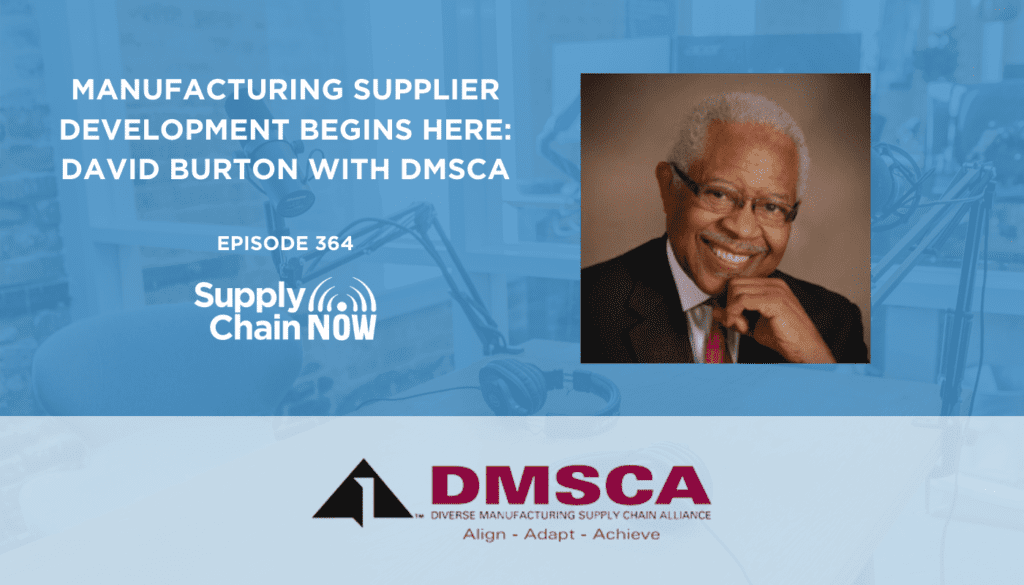
podcast
March 21, 2021
Supply Chain Now Episode 364
“Supplier development is a journey. It’s not something that’s going to take place overnight, and both the supplier and the corporation have to be committed to that journey.” – David Burton, Founder and CEO at the Diverse Manufacturing Supply Chain Alliance The Diverse Manufacturing Supply Chain Alliance (DMSCA) is a Washington, D.C. area based nonprofit organization formed to provide direct development support to select mature and maturing manufacturing suppliers towards their achievement of operational excellence, sustained engagement and business development, and continuous improvement in industry group segmented digitized supply chains. Under the leadership of Founder and CEO David Burton, the DMSCA team focuses their work around three key terms: align, collaborate, and achieve. These days, they are placing the majority of the emphasis on collaboration between suppliers and customers. If they can help foster a collaborative relationship early enough in the process to provide suppliers with sufficient ROI from the engagement it can lead to accelerated performance alignment. In this conversation, David joins Supply Chain Now to provide Co-hosts Greg White and Scott Luton to discuss: The key areas of investment suppliers need to be focused on now, including predictive analytics, cross-enterprise maturity, cybersecurity, and environmental sustainability Why COVID-19…
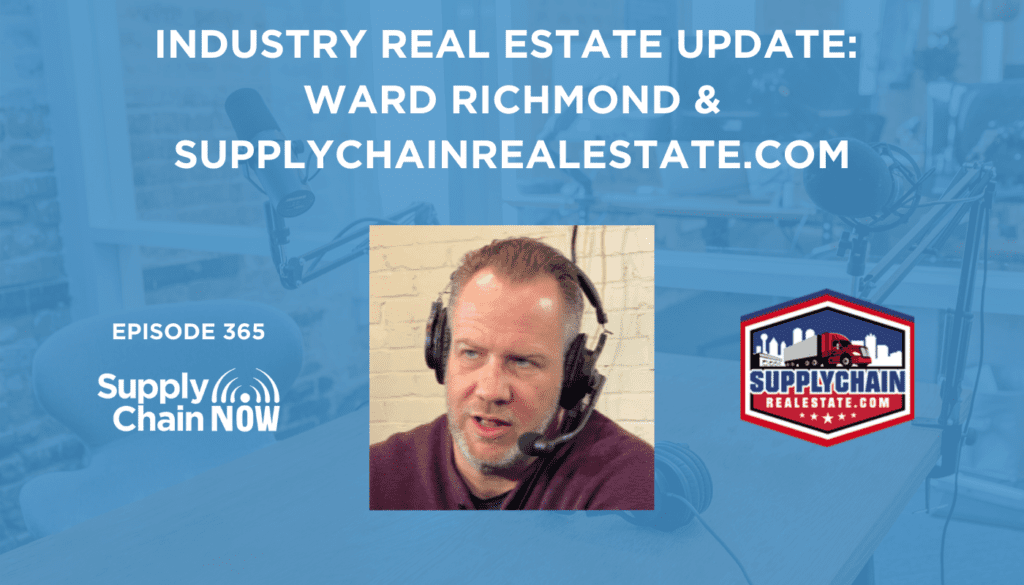
podcast
March 21, 2021
Supply Chain Now Episode 365
“Companies who have not adjusted to the eCommerce world that we’re living in are in a world of hurt. If they don’t have the supply chain infrastructure to support the growing demand for eCommerce in the Amazon effect, they’re going to have a lot of trouble surviving in the 2020s.” – Ward Richmond, Executive Vice President at Colliers International For years now, companies have been looking to do more with less when it comes to real estate, making the most of expensive investments. In the wake of the COVID-19 pandemic, the trend has reversed, with companies looking to have enough space to maintain the safety of their teams without skyrocketing overhead. Ward Richmond is an Executive Vice President and shareholder at Colliers International, as well as a blogger at supplychainrealestate.com. The U.S. industrial real estate review for Q1 2020 has just been released, and while the real estate market has changed significantly in the last 3 months, it still provides valuable benchmarks and insight that companies can use. In this conversation, Ward returns to the show to provide Supply Chain Now Co-hosts Greg White and Scott Luton with an update on: Why the economic indicators from Q1 2020 bear…

